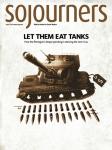To me as someone who has been teaching the Bible for decades, the new volume Freedom Journeys: The Tale of Exodus and Wilderness across Millennia felt very much like a treasure trove, full of gifts and surprises. Written by two rabbis who share marriage and long-term, faith-based activism, Arthur Waskow and Phyllis Berman, this book is itself a journey through ancient stories with vital relevance for our world today.
Freedom Journeys: The Tale of Exodus and Wilderness across Millennia is as important for its style as for its contents. Don't expect the typical "biblical commentary" that we Christians are used to. Far from a precise and orderly verse-by-verse analysis rife with heavy scholarship and intellectualism, Waskow and Berman are doing modern midrash, which means entering deeply into the story, undertaking a sustained dialogue with the story, playing with it, arguing with it, teasing out strands of meaning. They read beneath the words, between the lines, attuned to what the ancient rabbis called "the white fire" of the blank spaces as well as "the black fire" of the words. Their text brims with delight and passion, wonder and concern. They bring in the voices of the Talmudic rabbis and modern climate scientists, their own children and contemporary activists. They move between millennia, offering a variety of angles on the story from different epochs and different communities in the throes of struggle. And, in a particularly important opening for Christian Bible readers, they are attuned to the brilliant wordplay in Torah, offering fascinating insights from the nuances of Hebrew words and phrases, and seeing verbal clues that suggest astonishing connections between different parts of the story.
This book underscores a longstanding concern of mine: that the church needs to be freed from the shackles of the early Greek conceptual models of rationality and the later European Enlightenment tradition, both of which, I believe, have hampered our capacity to read our scriptural texts with authenticity. Reading Waskow and Berman, we Christians might sense the beginning of a path back to the Jewish sensibilities at the core of our tradition.
But there is also remarkable content. Freedom Journeys is replete with fresh, creative, and sometimes startling interpretations of the familiar biblical tales. For instance, they write with poignancy of Joseph "walking in darkness," unknowingly creating the blueprint for the imperial system that would eventually land his people in slavery. They see the divine name given to Moses at the burning bush, YHWH, as less a name and more of an act of breathing itself -- unveiling God as the Breath of Life. They offer a remarkable connection between the stories of Eden and manna: "This Shabbat-of-manna betokened the first stage of a peace agreement to end the primordial war between adam (human beings) and adamah (earth), the war that began as we left Eden. What started with a troubled act of eating is healed with a jubilant act of eating." Sometimes the text is sheer poetry, such as the dialogue between the people and the universe at the foot of Sinai.
A high reverence for the Bible can sometimes cause a certain timidity among Christian readers. Not so Waskow and Berman. Here we find some bold, even outrageous rereadings of familiar stories, out of a love for Torah and a passionate concern for its meaning and power for our contemporary crises and challenges. The section titled "Death, Rebellion, and War" is one of almost breathtaking wisdom as Waskow and Berman deal with violent episodes in the wilderness tradition (such the slaughter of the Midianites in Numbers 31), finding in these "texts of terror" some genuine seeds of peace for our violent world.
In the spirit of interfaith dialogue, Freedom Journeys also includes chapters by two longtime friends of and contributors to Sojourners, Ched Myers (co-writing with Russell Powell) and Vincent Harding, as well as an enlightening reading by Muslim S. Ayse Kadayifci-Orellana (yes, these stories are also in the Quran).
The Exodus and wilderness stories have lived for two millennia, inspiring and emboldening many communities in times of historical struggle. Waskow and Berman believe these stories can and must live again today. They can help us name our Pharoahs and plagues, our hungers and threats, our paths and our promised lands -- and, with help from such gifted teachers as Rabbis Waskow and Berman, these old stories can show us the way toward true freedom.
William O’Brien is a writer, teacher, and activist on issues of homelessness and poverty. He is coordinator of The Alternative Seminary (www.alternativeseminary.net) in Philadelphia.

Got something to say about what you're reading? We value your feedback!